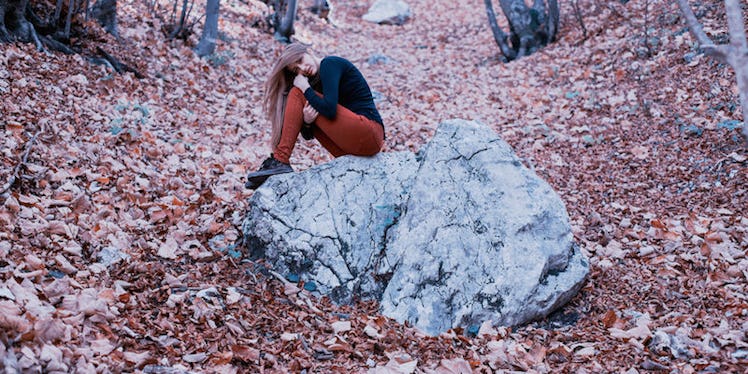
This Generation Would Rather Take Pictures For Likes Than Offer Help
Why do some people feel it's okay to trivialize tragic events? How can anyone justify seeing another person in danger and not stepping in?
Is it selfishness, cowardice or ignorance?
Perhaps it's a combination of all three.
Unfortunately, the trend of people whipping out their smartphones at the least appropriate moments has increased a great deal in recent years.
In the process, people have often disrespected the memory of deceased individuals or failed to help people who desperately needed it.
We saw this trend just this past week after an explosion in New York City's East Village. The tragic incident destroyed three apartment buildings.
Multiple people we injured, and two bodies were pulled from the scene of the explosion on Sunday afternoon.
Yet, people still felt it was acceptable to whip out the selfie stick and smile like they were in front of a tourist attraction:
Friday night #eastvillage @evgrieve pic.twitter.com/8OpG1d6mPy — EventPhotosNYC (@Eventphotosnyc) March 28, 2015
This is not an isolated incident. We've also witnessed people take selfies at places like Auschwitz, the location of one of the most heinous crimes against humanity in history.
Selfie in the Auschwitz Concentration Camp pic.twitter.com/cPVpGl3Hpb — Princess Breanna (@PrincessBMM) June 20, 2014
Memorials and museums that commemorate tragedies are meant to be sites for reflection and education, not self-absorption.
Perhaps it's even worse, however, to bear witness to violence and do nothing. As Holocaust survivor Elie Wiesel once stated:
There may be times when we are powerless to prevent injustice, but there must never be a time when we fail to protest.
We may not be able to step in and save the day in every situation, but speaking out is far better than simply watching.
Recently, a fight broke out at a McDonald's in Brooklyn. A 15-year-old girl was beaten by several other girls in front of a crowd of people. Someone videotaped the event.
Eventually, people came to the girl's aid, but it's incredibly disconcerting that someone's first instinct was to record the incident rather than intervene or dial 911.
A few months before that, a 16-year-old girl at the Union Square subway station in Manhattan fainted and fell onto the tracks. She was badly injured, with a deep gash in her head that would eventually require multiple stitches.
It was rush hour, meaning the station was packed, but the crowd just stood watching. Instead of helping, many snapped photos on their phones. Luckily, one man couldn't stand to see people do nothing, so he jumped onto the tracks and lifted her body to safety.
It seems exceptionally inhumane to stand by and record these types of incidents instead of making any effort to rectify the situation. It's one thing to want to provide evidence, it's another to ignore a human being in need.
There's nothing wrong with desiring to document history, whether it's your own story or an event you're bearing witness to. But context plays a very important role in this regard.
Journalists, for example, make a career out of recording history and explaining it to the masses. They perform one of the most vital roles in society. An informed populace is imperative to both the establishment and perpetuation of basic freedoms.
With the rise of the smartphone and social media, we've also seen the advent of the citizen journalist. These people have no journalistic experience, yet might find themselves taking photos or recording video in the midst of a war zone.
There are both pros and cons to these developments. Without getting into them, we can all agree there are certain circumstances in which filming, taking pictures or snapping selfies is completely inappropriate.
It seems more often than not, Millennials are the culprits in these situations.
Generation-Y is a very contradictory and complicated generation. On the one hand, it's one of the most generous and service-oriented groups in recent history.
Statistically, Millennials volunteer more than previous generations and are extremely inclined to give their money to charity. They are very concerned with social change and exhibit a strong propensity for innovation.
In spite of this, Gen-Y is often labeled as narcissistic, selfish and lazy. When you see young people take selfies at scenes of destruction, this characterization gets reinforced.
Social media has the capacity to empower this generation, and in many ways already has. We've seen it at the center of revolutionary movements, from the Arab Spring to Occupy Central and Ferguson.
It's also been a catalyst for entrepreneurship and economic mobility for the generation most heavily impacted by the Great Recession. Indeed, social media has arguably been Generation-Y's greatest tool.
Simultaneously, however, social media is a debilitating entity that often makes us less connected, more narcissistic and increasingly disengaged.
Millennials have a choice. They can continue to use the Internet and social media as a means of bringing about social change and innovation, or they can allow it to disintegrate into a platform for vanity and apathy.
The Internet is meant to be both informative and fun. Its success depends on all of us finding a healthy balance between the two in terms of the way we utilize it.
Taking selfies in the midst of danger or the aftermath of disaster epitomizes imbalance.
Citations: Millennials Are Volunteering More Than Past Generations And Havent Even Peaked Yet (Huffington Post), Millennials And Giving 5 Things That Prove Young People Arent Just Slacktivists (Huffington Post), Video Shows Multiple Girls Beating 15YearOld in Brooklyn McDonalds in Front of Crowd (ABC ), Commuters stood gawking and taking cell phone photos after teen fainted and fell onto subway tracks before one Good Samaritan jumped down to save her (Daily Mail ), Bodies at East Village site believed to be men missing since explosion (Al Jazeera), The Worst Places To Take A Selfie (The Telegraph )